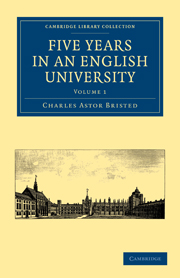Book contents
- Frontmatter
- PREFACE
- Contents
- First Impressions of Cambridge
- Some Particulars, rather Egotistical, but very Necessary
- Introduction to College Life
- The Cantab Language
- An American Student's First Impressions at Cambridge and on Cambridge
- Freshman Temptations and Experiences—Toryism of the Young Men, and Ideas Suggested by it
- The Boat Race
- A Trinity Supper Party
- The May Examination
- The First Long Vacation
- The Second Year
- Third Year
- Private Tuition
- Long Vacation Amusements
- A Second Edition of Third Year
- The Scholarship Examination
- The Reading Party
- Sawdust Pudding with Ballad Sauce
- 'Ev Ξvpoũ 'Akμή
- How I came to Take a Degree
- The πoλλoí and the Civil Law Classes
- The Classical Tripos
- A Visit to Eton
- Being Extinguished
- Reading for a Trinity Fellowship
- The Study of Theology at Cambridge
- Recent Changes at Cambridge
The Second Year
A Change of Dynasty.—The Little Go.—Conflict of University and College Systems.—Various Examinations
Published online by Cambridge University Press: 28 April 2011
- Frontmatter
- PREFACE
- Contents
- First Impressions of Cambridge
- Some Particulars, rather Egotistical, but very Necessary
- Introduction to College Life
- The Cantab Language
- An American Student's First Impressions at Cambridge and on Cambridge
- Freshman Temptations and Experiences—Toryism of the Young Men, and Ideas Suggested by it
- The Boat Race
- A Trinity Supper Party
- The May Examination
- The First Long Vacation
- The Second Year
- Third Year
- Private Tuition
- Long Vacation Amusements
- A Second Edition of Third Year
- The Scholarship Examination
- The Reading Party
- Sawdust Pudding with Ballad Sauce
- 'Ev Ξvpoũ 'Akμή
- How I came to Take a Degree
- The πoλλoí and the Civil Law Classes
- The Classical Tripos
- A Visit to Eton
- Being Extinguished
- Reading for a Trinity Fellowship
- The Study of Theology at Cambridge
- Recent Changes at Cambridge
Summary
Inclytus Albertus, doctissimus atque disertus,
Quadrivium docuit et omne scibile scivit.—
After the trial heat of the first May examination, the field of candidates for Honors begins to assume something like a calculable form. The ruck falls off rapidly, and the good men settle down to their pace. Many of them are now for the first time under crack private tutors—for it frequently, indeed usually happens, that a “coach” of reputation declines taking men into his team before they have made time in public. When the Freshman has not a public-school reputation, and sometimes even when he has, the result of the May decides whether he will go out in Honors or not—that is, whether he will be a reading or a non-reading man (for with all but the very badly prepared, going out in Poll is equivalent to doing nothing—so far as University studies are concerned—for at least half the course). If his success be such as to encourage him, he begins his work again, as has been observed, early in the Long vacation, towards the close of which, however, he takes a real vacation of a month or so (generally provided for in all engagements with private tutors, or for reading-parties), so as to come to his work fresh at the beginning of the college term. Though not so decisive in its results as the third year, this second year is the turning point for not a few.
- Type
- Chapter
- Information
- Five Years in an English University , pp. 116 - 156Publisher: Cambridge University PressPrint publication year: 2010First published in: 1852



